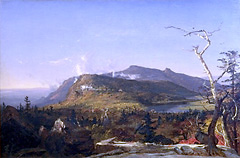Curriculum Materials: Art in America
|
|
Image 10 Jasper Cropsey Questions: |
Think Questions Teacher Answer Key
1. Would you like to visit this place? Why or why not? If you did visit, what could you do there?
2. This painting is called a LANDSCAPE. Why do you think it is called that? The title is Catskill Mountain House. Do you think the Catskill Mountain House is the subject of the painting? Why or why not? If you could give the painting another title, what would you call it? Why?
3. Why do you think Cropsey chose to show this scene in autumn? Why not in winter? Spring?
4. What do you think of when you hear the word "wilderness"? Does this look like a wilderness? Why or why not? Is a wilderness safe or scary? Peaceful or exciting? Have you been in a wilderness? What was it like? The American Indians had lived in this land for years before Europeans came. Do you think they thought of it as wilderness? Why would Europeans and American Indians view the area differently?
5. Why do you think there was such a great demand for LANDSCAPE paintings like this one in 19th-century America? (The paintings were beautiful; people had never seen the areas pictured or they had been there and wanted to remember them, etc.) Increased production of popular PRINTS and the use of color illustrations in magazines made landscape images available to a wide spectrum of Americans. How might this have contributed to a demand for paintings? What might the paintings have offered that prints or illustrations could not? Why didn't people just take photographs of landscapes? (Easy-to-use cameras like the Instamatics we have today had not been invented.)
6. How does Cropsey's painting visually express the philosophy of Manifest Destiny, popular in 19th-century America, that proposed that European Americans were destined by God to civilize, tame, and dominate this land?
7. Compare and contrast Jasper
Cropsey's Catskill Mountain House to George Morrison's
Collage IX: Landscape. Do you think these
LANDSCAPES look like
actual or imaginary places? Why? What kinds of information
does each artist give us about the place represented? Which
work is
NATURALISTIC? Which
is ABSTRACT? What
elements do these artworks share? (Some colors and a
HORIZON LINE.) How do the techniques used to create
these works differ? How does each artist reveal his attitude
about the landscape? Do the materials each artist used give
any clues about his attitude? If so, how?
|
|
